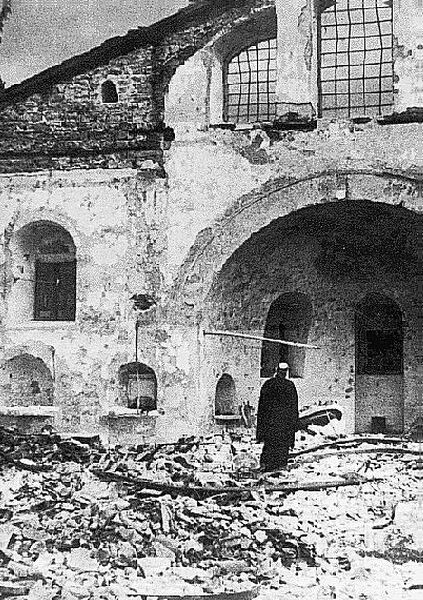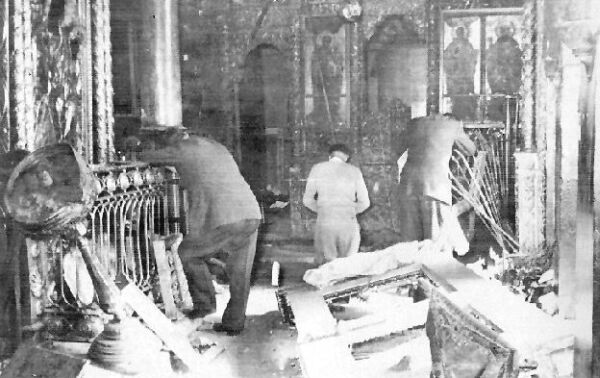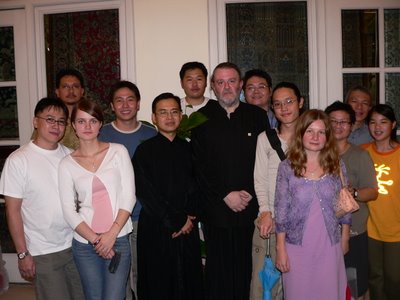Why do I lament? 553 years ago yesterday (May 29th according to the Julian Calendar), Constantinople - the City of Constantine, the New Rome, the Queen of Cities - fell to the Turks. The last Christian emperor of the Romans, Constantine XI Palaeologus, died bravely defending the City to the end. A sorrowful event still to all true Christians, lovers of Byzantium and the Classical world. It would strike some as odd that this event would affect me so strongly and personally.

The City of Constantine the Great, New Rome, Queen of Cities
I'll try to give as much details about the event as this post would allow me:
Since April 2nd, 1453, a vast Ottoman army, numbering over 100,000, had beseiged the City. There were no more than 7000 defenders, out of which 2000 were foreigners - among the foreingers were 700 Genoese soldiers under the command of the brilliant Giovanni Giustiniani Longo and 200 archers sent by Pope Nicholas V and led by Cardinal Isidore. On the night of May 22nd, the sky was darkened by a lunar eclipse - a bad omen.
On Monday, May 28th, some final repairs were made to the walls and stockades damaged by Turkish cannons. In the City herself, the bells of every church rang mournfully as civilian and soldier alike joined a long procession behind the holy relics brought out of the churches. Singing - in Greek, Latin, Catalan and the various Italian dialects - hymns - Orthodox and Catholic - the men, women, children, soldiers, civilians, clergy and monastics, knowing that they had not much time to live, made peace with themselves and God.
When the procession ended, the Emperor met with his commanders along with the nobles of the City. In an impassioned speech - Gibbon called it the 'funeral oration of the Roman Empire' - he beseeched the defenders of the city to fight on without fear:
 Gentlemen, illustrious captains of the army, and our most Christian comrades in arms: we now see the hour of battle approaching. I have therefore elected to assemble you here to make it clear that you must stand together with firmer resolution than ever. You have always fought with glory against the enemies of Christ. Now the defence of your fatherland and of the City known the world over, which the infidel and evil Turks have been besieging for two and fifty days, is committed to your lofty spirits.
Gentlemen, illustrious captains of the army, and our most Christian comrades in arms: we now see the hour of battle approaching. I have therefore elected to assemble you here to make it clear that you must stand together with firmer resolution than ever. You have always fought with glory against the enemies of Christ. Now the defence of your fatherland and of the City known the world over, which the infidel and evil Turks have been besieging for two and fifty days, is committed to your lofty spirits.
...
You are aware that the impious and infidel enemy has disturbed the peace unjustly. He has violated the oath and treaty that he made with us; he has slaughtered our farmers at harvest time; he has erected a fortress on the Propontis as it were to devour the Christians; he has encircled Galata under a pretence of peace.
Now he threatens to capture the city of Constantine the Great, your fatherland, the place of ready refuge for all Christians, the guardian of all Greeks, and to profane its holy shrines of God by turning them into stables for fits horses. O my lords, my brothers, my sons, the everlasting honour of Christians is in your hands.
...
You, my comrades in arms, obey the commands of your leaders in the knowledge that this is the day of your glory - a day on which, if you shed but a drop of blood, you will win for yourselves crowns of martyrdom and eternal fame.
When the shades of evening began to fall, people moved as if by instinct to the Church of the Holy Wisdom. The soldiers stayed at their posts on the walls.
Inside, the people began singing hymns, some openly crying and others asking each other for forgiveness. Greeks and Latins alike, gathered to pray together for their deliverance. Common fear worked more of a wonder than all the councils of the Church. For the last time, the Akathist Hymn was sung before the holy "Odigitria" icon of the Virgin, made by the Evangelist Luke. Orthodox bishops, priests and monks who had protested that they would never again set foot in their cathedral until it had been purged of Latin pollution, now came to the altar to join their Catholic brethren in the holy liturgy.
Among the celebrants was Cardinal Isidore, whom many of the faithful had branded a traitor and heretic. The Emperor came to pray and ask forgiveness from every bishop present before receiving communion at the altar.
The priest who have him the sacrament cannot have known that he was administering the last rites to the last Christian Emperor of the Romans.From the great church, the Emperor rode to the Palace at Blachernae, where he asked his household to forgive him for any sins committed toward them. He then bade the emotionally shattered men and women farewell and rode away for a last inspection of the defensive positions.

The final assault began after midnight, in the early hours of May 29th, 1453. Wave after wave of enemy warriors stormed the walls. The battle for the City raged on till sunrise, when the first enemy flags were seen on the walls. The Emperor and his commanders frantically tried to rally their troops, but it was too late. Waves of janissaries, followed by the regular units of the Ottoman army, were crashing through the gates. Realising everything was lost, the Emperor cast aside the imperial insignia and followed by his cousin Theophilus Palaeologus, as well as Don Francisco of Toledo and John Dalmatus, charged into the sea of enemy soldiers, never to be seen again.
A civilisation spanning over a millenium lost in a few days. The barbarians did not respect anything holy - icons, books, paintings and mosaics. They vandalised and demolished ancient monuments - churches and palaces alike - some dating back to the 4th century. Their greed for devastation has not yet been satiated, even after five centuries.
The evocative words of Bishop Kallistos (Ware) of Diokleia describing the events of that terrible day, from his book,
The Orthodox Church:
Outnumbered by more than twenty to one, the Byzantines maintained a brilliant but hopeless defense for seven long weeks. In the early hours of 29 May, the last Christian service was held in the great Church of the Holy Wisdom. It was a united service of Orthodox and Roman Catholics, for at that moment of crisis, supporters and opponents of the Florentine Union forgot their differences. The Emperor went out after receiving communion, and died fighting on the walls. Later the same day the city fell to the Turks, and the most glorious church on Christendom became a mosque.
I can hardly read that last line without spitting.
There is a legend, which I fondly believe...
If you should chance to see, gliding in the clear water of a stream, seven strange fish, half fried and yet alive, do not be amazed. They are the fish of a poor monk who could not believe that the Turks had entered Constantinople. Squatting by the stram, he was cooking his meal over a wood fire and had already fried the fish on one side. He was about to turn them when he heard the fateful news.
"Never shall the infidels enter the City!" cried the monk, "any more than these fish come back to life!" Then, with a vigorous flick of their tails the seven fish leaped out of the boiling oil and into the stream, half fried and half alive... Forever? No! When we recapture the City, another monk will come and the seven fish will allow themselves to be caught by him; and, like the first, he will light his wood fire by the stream and will finish his frying.
 ...because Catholicity cannot be truly ‘Catholic’ - universal - without you, without the other authentic and apostolic ‘half’ of Christ’s Church [Orthodoxy], we have no intention of replacing you in this Church, for you are the only one capable of preparing us [the Eastern Catholics] a place in it.
...because Catholicity cannot be truly ‘Catholic’ - universal - without you, without the other authentic and apostolic ‘half’ of Christ’s Church [Orthodoxy], we have no intention of replacing you in this Church, for you are the only one capable of preparing us [the Eastern Catholics] a place in it.
















